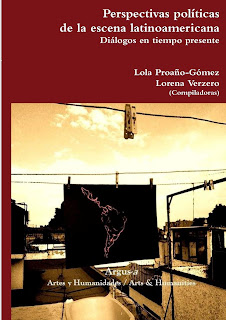Este libro puede adquirirse en amazon.com y en lulu.com
Foto de tapa: gentileza de Cristian A. Aravena.
 En Perspectivas políticas de la escena latinoamericana. Diálogos en tiempo presente, Lola Proaño Gómez y Lorena Verzero compilan los trabajos presentados y discutidos en el I Simposio sobre Teatro Contemporáneo, Política y Sociedad en América Latina, desarrollado en Buenos Aires, Argentina en julio de 2016. Dicho encuentro se propuso generar un diálogo que traspasara las fronteras nacionales y que enriqueciera los estudios teatrales mediante la apertura hacia voces provenientes de otros espacios, con énfasis en la interdisciplinariedad como modo de pensar la relación entre teatro y política. Participaron colegas de Brasil, Cuba, Ecuador, Chile y Uruguay, siendo la Argentina el país anfitrión. A sus contribuciones se suman los comentarios a los artículos que, en tal ocasión, hicieran los integrantes del Grupo de Estudios sobre Teatro, Política y Sociedad en América Latina, radicado en el Instituto de Investigaciones Gino Germani, Facultad de Ciencias Sociales de la Universidad de Buenos Aires, organizador del evento.
En Perspectivas políticas de la escena latinoamericana. Diálogos en tiempo presente, Lola Proaño Gómez y Lorena Verzero compilan los trabajos presentados y discutidos en el I Simposio sobre Teatro Contemporáneo, Política y Sociedad en América Latina, desarrollado en Buenos Aires, Argentina en julio de 2016. Dicho encuentro se propuso generar un diálogo que traspasara las fronteras nacionales y que enriqueciera los estudios teatrales mediante la apertura hacia voces provenientes de otros espacios, con énfasis en la interdisciplinariedad como modo de pensar la relación entre teatro y política. Participaron colegas de Brasil, Cuba, Ecuador, Chile y Uruguay, siendo la Argentina el país anfitrión. A sus contribuciones se suman los comentarios a los artículos que, en tal ocasión, hicieran los integrantes del Grupo de Estudios sobre Teatro, Política y Sociedad en América Latina, radicado en el Instituto de Investigaciones Gino Germani, Facultad de Ciencias Sociales de la Universidad de Buenos Aires, organizador del evento.
El contenido de este libro es rico y variado y está dividido en tres partes: panoramas teórico-teatrales de Cuba, Chile y Uruguay; tres ejemplos de teatralidades disruptivas en Brasil, Chile y México y testimonios sobre la dirección con miradas que vienen de Chile, Brasil y Ecuador. Además, consta de la transcripción del desmontaje de los tres espectáculos a los que asistieron y discutieron los integrantes del Simposio. El libro se cierra con los Apéndices que proveen información adicional..
In Political Perspectives of the Latin American Scene. Dialogues in Present Time, Lola Proaño Gómez and Lorena Verzero compile the papers presented and discussed at the First Symposium on Contemporary Theater, Politics and Society in Latin America, held in Buenos Aires, Argentina in July 2016. The I Symposium proposed to create a dialogue in order to transcend national boundaries, and to enrich Latin America theatrical studies by sharing the space with voices proceeding from various Latin American countries; also, the I Symposium placed especial emphasis on an interdisciplinary approach as a way of pushing innovative thinking regarding the relationship between theater and politics. Renowned academic and theatre researchers from Brazil, Cuba, Ecuador, Chile and Uruguay were invited, while Argentina was the host country. Each of the articles is preceded by a commentary made by one of the members of the Theater, Politics, and Society in Latin America group of study (Gino Germanni Institute, UBA), organizer of the event. The content of this book is rich and varied and is structured into three parts: Theoretical-theatrical panoramas of Cuba, Chile and Uruguay; disruptive theatricalities in Brazil, Chile and Mexico and finally, testimonies about the theater direction from Chile, Brazil and Ecuador. It also consists of the transcription of the disassembly of the three theatre plays that the Symposium participants attended and discussed on that occasion. The book also has Appendices that provide additional information.

